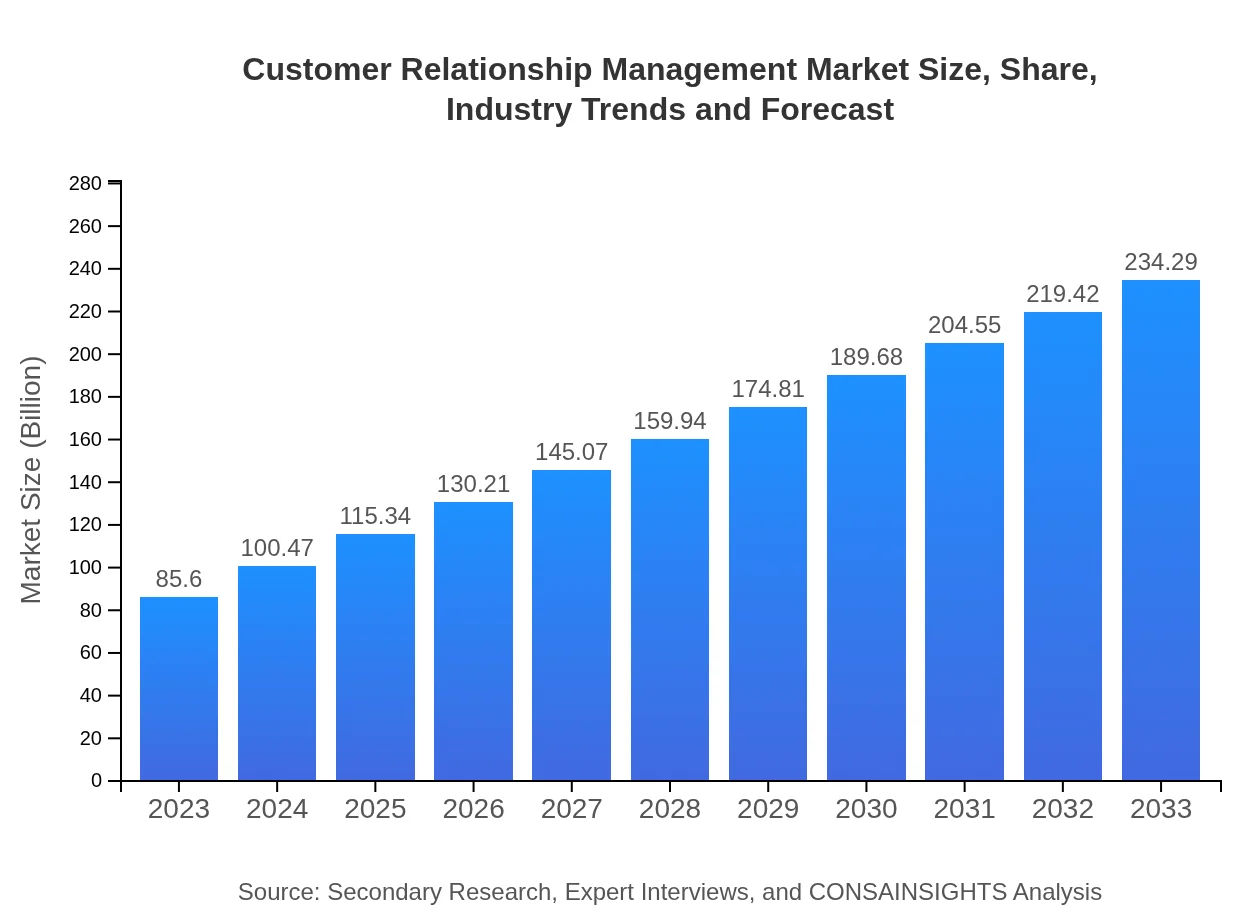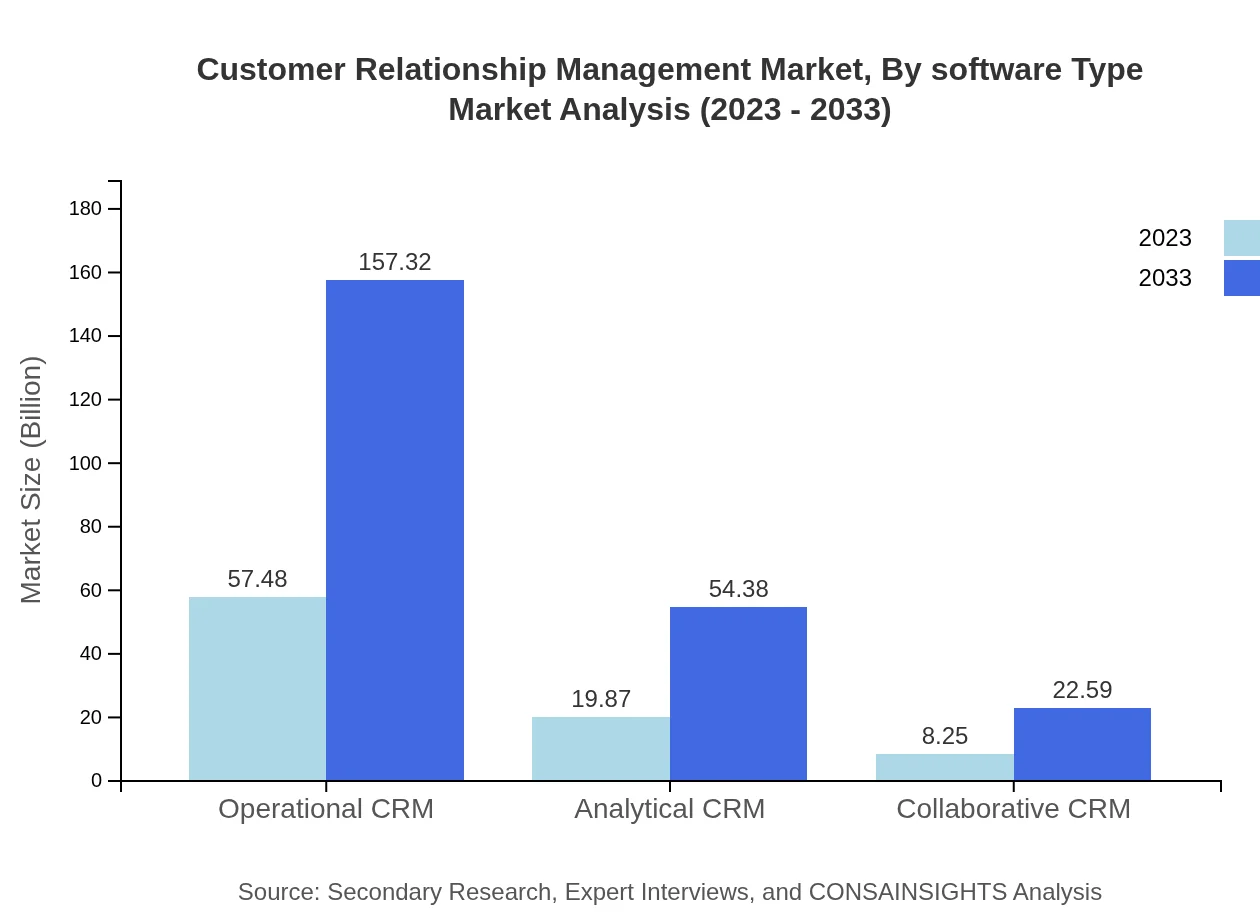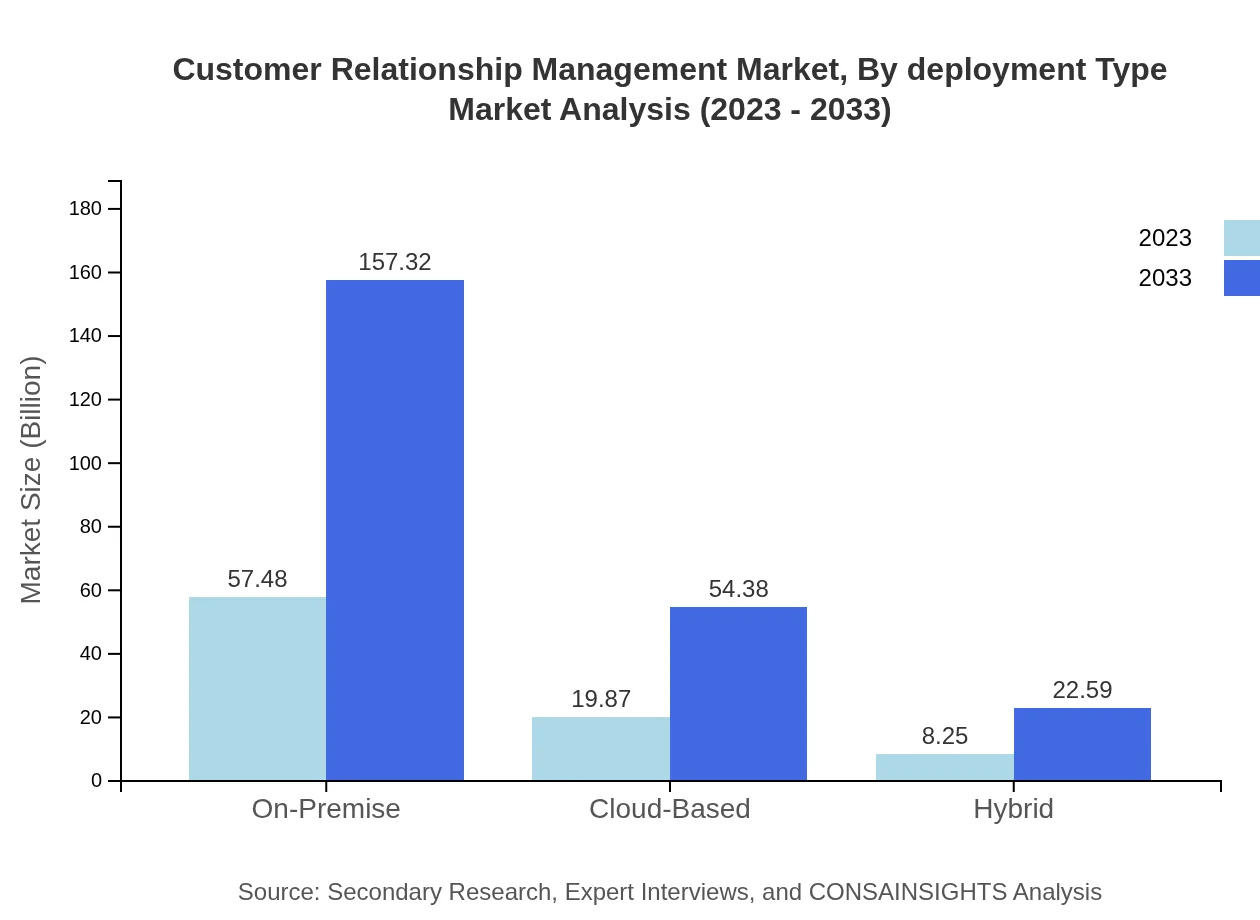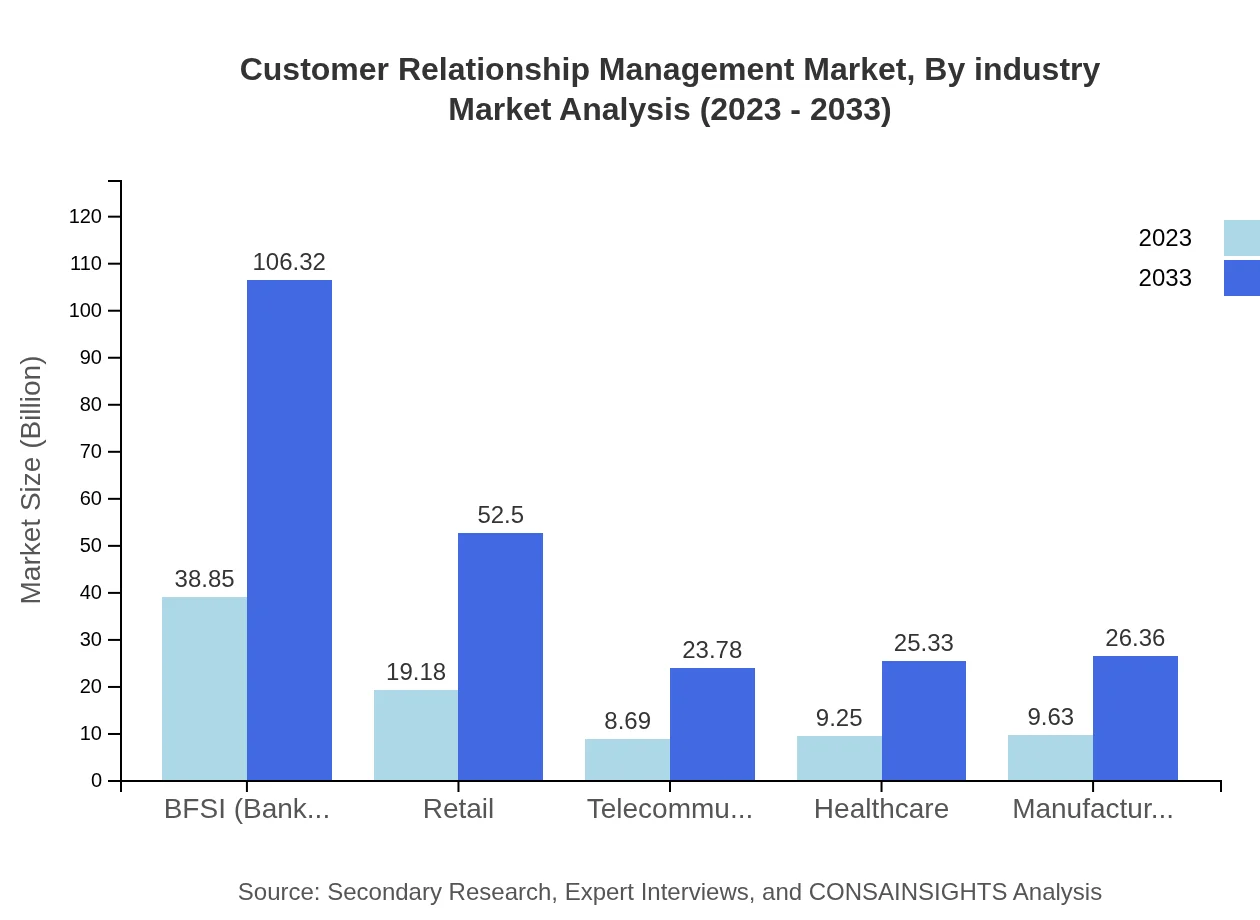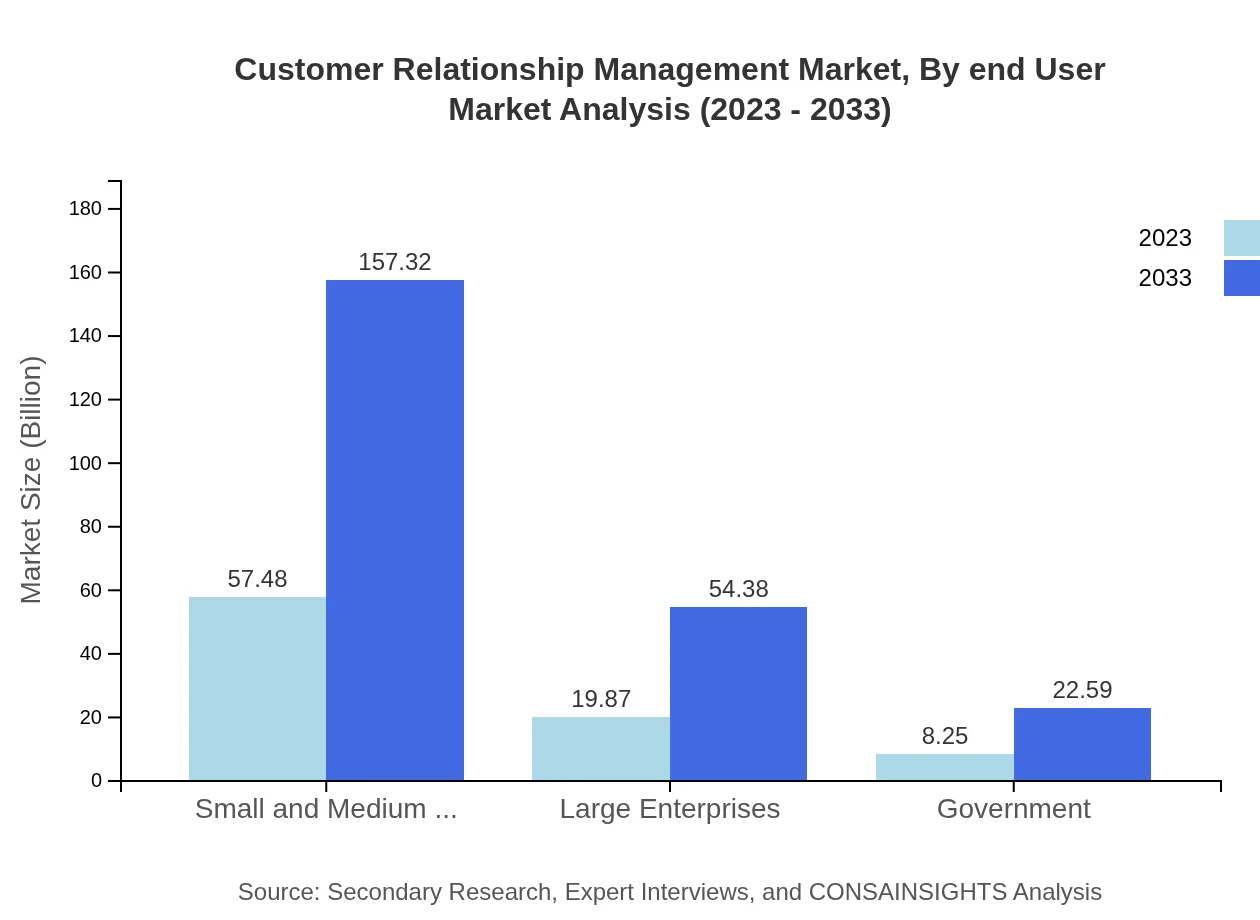Customer Relationship Management Market Report
Published Date: 31 January 2026 | Report Code: customer-relationship-management
Customer Relationship Management Market Size, Share, Industry Trends and Forecast to 2033
This report encompasses the comprehensive analysis of the Customer Relationship Management (CRM) market, providing insights on market size, key trends, segmentation, and geographical analysis for the forecast period of 2023 to 2033.
| Metric | Value |
|---|---|
| Study Period | 2023 - 2033 |
| 2023 Market Size | $85.60 Billion |
| CAGR (2023-2033) | 10.2% |
| 2033 Market Size | $234.29 Billion |
| Top Companies | Salesforce, Microsoft Dynamics, Oracle, SAP, HubSpot |
| Last Modified Date | 31 January 2026 |
Customer Relationship Management Market Overview
Customize Customer Relationship Management Market Report market research report
- ✔ Get in-depth analysis of Customer Relationship Management market size, growth, and forecasts.
- ✔ Understand Customer Relationship Management's regional dynamics and industry-specific trends.
- ✔ Identify potential applications, end-user demand, and growth segments in Customer Relationship Management
What is the Market Size & CAGR of Customer Relationship Management market in 2023?
Customer Relationship Management Industry Analysis
Customer Relationship Management Market Segmentation and Scope
Tell us your focus area and get a customized research report.
Customer Relationship Management Market Analysis Report by Region
Europe Customer Relationship Management Market Report:
Europe's CRM market is expected to grow from $26.57 billion in 2023 to $72.72 billion by 2033, influenced by stringent regulations on customer data and the growing importance of customer relationship management in a competitive landscape.Asia Pacific Customer Relationship Management Market Report:
In the Asia Pacific region, the CRM market size is forecasted to grow from $16.43 billion in 2023 to $44.96 billion by 2033. This growth is driven by rapid digitalization and increasing demand for robust customer engagement strategies across various industries, particularly in countries like India and China.North America Customer Relationship Management Market Report:
North America is the leading region for the CRM market, projected to reach $79.35 billion by 2033, up from $28.99 billion in 2023. The robust presence of major CRM companies and the strong emphasis on customer satisfaction strategies underlie this significant growth.South America Customer Relationship Management Market Report:
In South America, CRM market size is anticipated to increase from $2.99 billion in 2023 to $8.18 billion by 2033. The growing adoption of cloud technology and digital customer interaction strategies are key factors in this growth.Middle East & Africa Customer Relationship Management Market Report:
The Middle East and Africa CRM market is projected to expand from $10.62 billion in 2023 to $29.08 billion by 2033, driven by increasing investments in technology and a rising emphasis on enhancing customer service.Tell us your focus area and get a customized research report.
Customer Relationship Management Market Analysis By Software Type
The Customer Relationship Management market is primarily segmented into three software types: Operational CRM, Analytical CRM, and Collaborative CRM. As of 2023, Operational CRM accounts for 57.48% of the market share, driven by its ability to enhance internal processes and customer service. Analytical CRM, with a 19.87% share, serves critical roles in data analysis and customer insights, while Collaborative CRM, at 8.25%, facilitates customer-related collaboration across different departments.
Customer Relationship Management Market Analysis By Deployment Type
Deployment types for CRM solutions include on-premise, cloud-based, and hybrid models. The on-premise model dominates the market with a 57.48% share, offering organizations enhanced security and control over their data. Cloud-based deployment, holding a share of 19.87%, is gaining traction due to its scalability and cost-effectiveness, while hybrid models at 8.25% cater to organizations requiring flexible solutions.
Customer Relationship Management Market Analysis By Industry
Industries leveraging CRM systems span across BFSI, healthcare, retail, telecommunications, and manufacturing. BFSI leads with a share of 45.38% in 2023, as financial institutions prioritize customer retention and data analytics. Retail follows closely, contributing with a 22.41% share, focusing on personalized engagement with customers through data insights.
Customer Relationship Management Market Analysis By End User
The end-user segmentation showcases distinct dynamics between small and medium enterprises (SMEs) and large enterprises. SMEs currently hold a substantial market share of 67.15% in 2023, indicating their growing adoption of CRM systems, while large enterprises hold 23.21%, emphasizing their need for comprehensive, scalable solutions.
Customer Relationship Management Market Trends and Future Forecast
Tell us your focus area and get a customized research report.
Global Market Leaders and Top Companies in Customer Relationship Management Industry
Salesforce:
Salesforce is a global leader in CRM solutions, providing innovative cloud-based software that helps businesses manage customer relationships effectively while driving improved sales and customer service.Microsoft Dynamics:
Microsoft Dynamics offers a suite of CRM applications designed to empower organizations with tools for sales, service, and marketing to optimize their customer interactions and business processes.Oracle:
Oracle provides a comprehensive CRM solution packed with features aimed at optimizing customer experiences, utilizing advanced analytics and AI to enhance customer insights and decision-making.SAP:
SAP's CRM solutions facilitate enhanced customer engagement through integrated applications that support various business processes, leveraging data for improved customer relationships.HubSpot:
HubSpot offers a user-friendly, cloud-based CRM that helps businesses of all sizes streamline their processes, improve customer engagement, and gain valuable insights into their marketing efforts.We're grateful to work with incredible clients.









FAQs
What is the market size of customer Relationship Management?
The global Customer Relationship Management (CRM) market is valued at approximately $85.6 billion in 2023, with a projected CAGR of 10.2%, indicating significant growth potential by 2033.
What are the key market players or companies in this customer Relationship Management industry?
Key players in the CRM industry include Salesforce, Microsoft Dynamics, SAP, Oracle, and HubSpot, among others. These companies dominate the market through innovative solutions, cloud technology, and robust customer support.
What are the primary factors driving the growth in the customer Relationship Management industry?
The growth of the CRM industry is driven by increasing customer-centric business strategies, the need for effective data management, advancements in technology such as AI, and the rising adoption of digital platforms among enterprises.
Which region is the fastest Growing in the customer Relationship Management?
The fastest-growing region within the CRM market is Asia Pacific, which is projected to expand from $16.43 billion in 2023 to $44.96 billion by 2033, fueled by rapid digital transformation and small business growth.
Does ConsaInsights provide customized market report data for the customer Relationship Management industry?
Yes, ConsaInsights offers customized market report data tailored to specific requirements within the customer-relationship-management industry, ensuring that clients get the most relevant insights for their strategic planning.
What deliverables can I expect from this customer Relationship Management market research project?
Deliverables include comprehensive market analysis reports, regional insights, competitive intelligence, growth forecasts, segmentation analysis by industry and size, along with actionable recommendations.
What are the market trends of customer Relationship Management?
Key trends in the CRM market include the shift towards cloud-based solutions, increased focus on AI and machine learning for analytics, growing importance of customer experience management, and enhanced integration capabilities across platforms.

